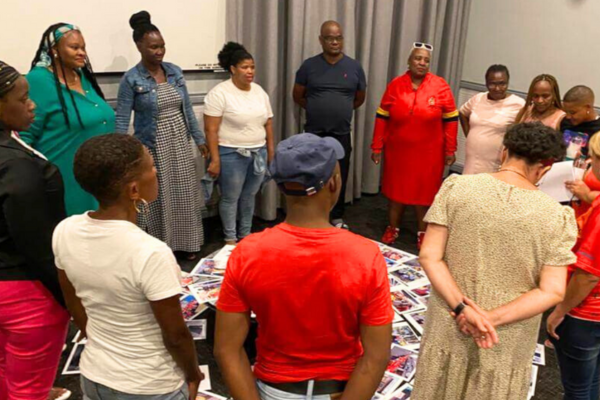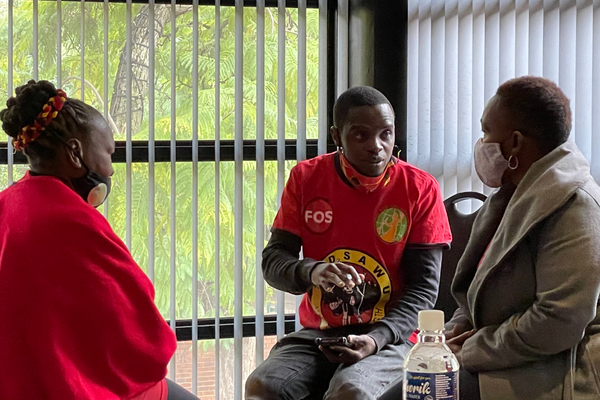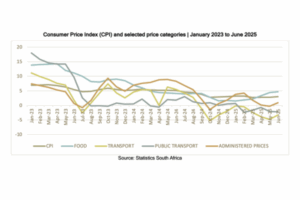Gender-based violence and harassment (GBVH) is a pervasive issue that transcends industries and borders and is deeply rooted in discriminatory gender norms, practices, institutions, and laws. In the workplace, GBV manifests in various forms, including sexual harassment, psychological violence, and cyberbullying, which can severely hinder a worker’s ability to perform their duties effectively. The Labour Research Service (LRS) supports unions and communities in exploring and implementing different approaches to preventing and eliminating GBV.
This blog highlights our initiatives in the health sector, education sector, garment manufacturing and retail, domestic work, and community engagement that are helping to advance a world of work free of gender-based violence.
Health sector: Zero tolerance for GBV

The health sector, where caregiving is often undervalued and underpaid, is ripe for transformation. Our social action initiative at a clinic in Gauteng Province is a pioneering effort to establish a zero-tolerance approach to GBV in the health system. This initiative focuses on actions to reduce violence and shift societal perceptions about the value of care work and healthcare workers. By having a supportive and safe environment, healthcare institutions can ensure that workers feel respected and protected, ultimately leading to better patient care and worker satisfaction. Read more.
Education sector: Ending school-related GBV

School-related gender-based violence (SRGBV) is a significant barrier to quality education and the well-being of students and educators alike. Our partnership with education unions in seven African countries demonstrates the significant role of teachers and their unions in transforming the norms, policies, and practices that perpetuate school-related gender-based violence. Through collaborative efforts, these unions are developing comprehensive strategies to address and prevent violence, ensuring that schools are safe spaces for all students and staff. Read more.
Garment manufacturing and clothing retail: Worker-led strategies for addressing GBVH

In the garment manufacturing and retail sectors, women constitute the majority of the workforce, and gender-based violence and harassment (GBVH) are widespread. Our participatory action research with the Southern African Clothing and Textile Workers’ Union (SACTWU) and the South African Commercial, Catering and Allied Workers Union (SACCAWU) empowers women and other marginalised workers in factories and shops to share their experiences of GBVH and actively participate in decision-making processes to address it. This worker-led approach ensures that the solutions are tailored to the specific needs and realities of the workers, fostering a more inclusive and respectful work environment. Read more.
Domestic workers reflect on their GBV experiences to develop prevention strategies

Domestic workers face significant vulnerability to GBV due to their isolation in private homes and undervalued work.
LRS partnered with the South African Domestic Service and Allied Workers Union (SADSAWU) in a participatory action research project. Domestic worker leaders in Gauteng and KwaZulu Natal investigated and analysed GBV in their workplaces, revealing widespread abuse, humiliation, sexual assault, and rape. Many workers feel silenced due to fear of job loss and victimisation. The research found that female employers often used abusive language and demeaning comments, projecting their frustrations onto domestic workers and causing severe emotional harm.
While the research didn’t produce a single prevention strategy, it enabled domestic workers to reflect on and voice their experiences of GBV, a critical first step toward developing effective prevention measures.
Working with communities to reduce GBV: The story of letsema
“It feels like God took his people and put them in the Vaal and forgot about them.”
Participant comment at the start of the Letsema intervention
Our work to eliminate GBV in communities centres on Letsema, an intervention for changing entrenched social norms in the Vaal Triangle. Letsema combines feminist leadership with organisation and community development in a Gender Action Learning (GAL) programme. Letsema has contributed to reducing incidences of GBV and provides a model for other communities in the Vaal and beyond seeking to address and prevent GBV effectively. Read more.
RELATED ARTICLES
What to do if you are sexually harassed at the workplace
Using C190 to support the struggle against homophobic and transphobic violence in the world of work







